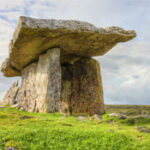
Living on a used planet
The Anthropocene, �the Age of Man,� has been presented as a story of new and accelerating human impact on Earth’s ecology — a threat to both humanity and the planet — due to industrial civilization.
But is this the true story of humankind and the biosphere?
Erle Ellis, a UMBC researcher, and his colleagues say, �not really,� in a new paper published in the Proceedings of the National Academy of Sciences (PNAS), “Used Planet: A Global History.”
Ellis, a professor of geography and environmental systems, and his colleagues say that the Anthropocene wasn�t born yesterday. �Human engineering of ecosystems, which changed the biosphere at globally significant levels in order to sustain human populations, likely began 3,000 years ago or earlier,� says Ellis. Most scientists talk about the Anthropocene beginning about 50 years ago,or at the most, 250 years ago.
Long before the emergence of agriculture, human populations had already begun adapting to denser populations by increasing the productivity of their land use systems, burning forests to attract game, consuming broader diets, and propagating favored species. The emergence of agriculture only continued the trend toward increasingly productive and intensive use of land.
�With the advent of fire,� says Ellis, �early humans started clearing land for hunting and gathering.� After the big game had been hunted out, which happened in many continents before the last ice age, Ellis says people turned their eyes towards smaller prey. In this way, people began to develop strategies to get more food out of the same amount of land. �We have been pushing past natural limits as long as we have been a species.�
Humans have been changing the plant for thousands of years. We live on a used planet and we shouldn�t think of people altering ecosystems as a recent disturbance.
Our ancestors adapted to the ecological changes made by their ancestors — all with the challenge of feeding growing populations from the same land. With advances in agriculture, we now use far less land per person. As our populations level off and concentrate within cities, more land can be returned to other species.
The, �reality is,� says Ellis, �is that rather than causing the sudden end of nature, industrial civilization lives in landscapes transformed by humans since prehistory.�
(5/1/13)





